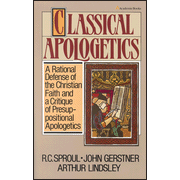Archive
B.H. Carroll and Robust Confessionalism
Tom Ascol
Should a church use a confession of faith? If so, how robust should that confession be? While few modern Baptists may be willing to identify with the Campbellite “no creed but Christ, no book but the Bible” approach to church life, considerably more seem to be skeptical of or even decidedly against the use of a robust confession of faith by local churches. Yet an extensive confession can serve a church well especially in seasons of doctrinal minimalism and confusion such as our own.
B.H. Carroll, the founder and first President of Southwestern Baptist Theological Seminary, understood this well and minced no words in his insistence on robust confessionalism. He rightly noted the inextricable connection between doctrine and devotion, faith and life. He writes,
All the modern hue and cry against dogma is really against morals. The more we reduce the number of the creed articles, the more we undermine practical religion.
Read the entire article here.
Words with different meanings:Example 5
 “Holy” and “sanctify” represent in our English Bibles one and the same Hebrew and Greek word in the original, but they are by no means employed with a uniform significance, being given quite a variety of scope and application — hence the diverse definitions of men. The word is such a pregnant one that no single English term can express it. That it signifies more than “set apart” is clear from what is said of the Nazarite:
“Holy” and “sanctify” represent in our English Bibles one and the same Hebrew and Greek word in the original, but they are by no means employed with a uniform significance, being given quite a variety of scope and application — hence the diverse definitions of men. The word is such a pregnant one that no single English term can express it. That it signifies more than “set apart” is clear from what is said of the Nazarite:
“all the days of his separation he is holy unto the Lord” (Numbers 6:8)
—“all the days of his separation he is separated” would be meaningless tautology. So of Christ,
“holy, harmless, undefiled, separate from sinners” (Hebrews 7:26),
where “holy” means much more than “separate.” When applied to God it imports His ineffable majesty (Isaiah 57:15). In many passages it expresses a moral quality (Romans 7:12; Titus 1:8). In others it refers to cleansing (Ephesians 5:26; Hebrews 9:13). Often it means to hallow or dedicate to God (Exodus 20:11; John 17:19). As the term is applied to the Christian it connotes, broadly speaking,
(1) that sacred relationship Godward into which grace has brought us in Christ;
(2) that blessed inward endowment by which the Spirit has made us meet for God and capacitated us to commune with Him;
(3) the changed life resulting therefrom (Luke 1:75; 1 Peter 1:15).
Arthur W. Pink-Interpretation of the Scriptures
Henry Wheeler Robinson
Henry Wheeler Robinson, 1872-1945 born Northampton, Northamptonshire, Eng. Notable Nonconformist English Baptist theologian and Old Testament scholar. Robinson studied at Regent’s Park College, London, the University of Edinburgh, Mansfield College, Oxford, and Marburg and Strasbourg universities (1890?1900), and then became Baptist minister at Pitlochry, Perthshire (1900?03), and St. Michael’s, Coventry
Source [Reformed Reader]
If you live by faith, then you are the “sons of Jacob”
 5. Then one more thought about who are the “sons of Jacob,” for I should like you to find out whether you are “sons of Jacob,” yourselves. They are men of peculiar character; for though there were some things about Jacob’s character which we cannot commend, there are one or two things which God commends. There was Jacob’s faith, by which Jacob had his name written amongst the mighty worthies who obtained not the promises on earth, but shall obtain them in heaven. Are you men of faith, beloved? Do you know what it is to walk by faith, to live by faith, to get your temporary food by faith, to live on spiritual manna-all by faith? Is faith the rule of your life? if so, you are the “sons of Jacob.”
5. Then one more thought about who are the “sons of Jacob,” for I should like you to find out whether you are “sons of Jacob,” yourselves. They are men of peculiar character; for though there were some things about Jacob’s character which we cannot commend, there are one or two things which God commends. There was Jacob’s faith, by which Jacob had his name written amongst the mighty worthies who obtained not the promises on earth, but shall obtain them in heaven. Are you men of faith, beloved? Do you know what it is to walk by faith, to live by faith, to get your temporary food by faith, to live on spiritual manna-all by faith? Is faith the rule of your life? if so, you are the “sons of Jacob.”
Then Jacob was a man of prayer-a man who wrestled, and groaned, and prayed. There is a man up yonder who never prayed this morning, before coming up to the house of God. Ah! you poor heathen don’t you prays No! he says “I never thought of such a thing- for years I have not prayed.” Well, I hope you may before you die. Live and die without prayer, and you will pray long enough when you get to hell. There is a woman: she did not pray this morning; she was so busy sending her children to the Sunday-school, she had no time to pray. No time to prays Had you time to dress? There is a time for every purpose under heaven, and if you had purposed to pray, you would have prayed. Sons of God cannot live without prayer. They are wrestling Jacobs. They are men in whom the Holy Ghost so works, that they can no more live without prayer than I can live without breathing. They must pray. Sirs, mark you, if you are living without prayer, you are living without Christ; and dying like that, your portion will be in the lake which burneth with fire. God redeem you, God rescue you from such a lot! But you who are “the sons of Jacob,” take comfort, for God is immutable.
Charles H. Spurgeon- The Immutability of God- A sermon delivered on Sabbath morning, Jan 7th, 1855
Free Ebook- The Lord’s Day: Its Presuppositions, Proofs, Precedents, and Practice
Now available at Chapel Library is a new (FREE) book titled The Lord’s Day: Its Presuppositions, Proofs, Precendents, and Practice by Sam Waldron: The Lord’s Day
The Lord’s Day is a thoroughly up-to-date consideration of the Fourth Commandment and its ramifications for modern Christianity. Its four sections include the Presuppositions that influence our thinking; Proofs at creation, by Moses, and in the New Testament; Precedents in the Apostolic Fathers and John Calvin; and finally its Practice. While precise and careful, the author avoids extremes and makes the nuances and complexities of the theological issues clear for most Christians.
Available in Epub, mobi, & Pdf
Source [Chapel Library]
An Appendix To A Confession Of Faith- Appendix Point 3
3. Although all the power of the creature to act be from the Creator, and there is a providence of God always extended to every creature, and to every action of the creature; yet we judge that the sinful corruption of the creature, and the sinfulness of the creature’s action, is from the creature, and not from God: and that it is a greatsin to say that God is the author if sin: Eccles. 7:29; Habak. 1:13; James 1:13,14,15; I Cor. 14:33; I Jn. 2:16. As touching that place which is here objected against us, viz., Amos 3:6. Shall there be evil in a City, &c. We conceive that it is either to be rendered according to the last Translation in the margin, Shall there be evil in a City, and shall not the Lord do something? or else that it is to be understood only of the evil of punishment, and not of the evil of sin.
Benjamin Cox- An Appendix To A Confession Of Faith
Studies in The Baptist Catechism: Section Three – The Decrees of God (Q.14)
William F. Leonhart III
Q.14: What are God’s works of providence?
A. God’s works of providence are His most holy,1 wise,2 and powerful preserving3 and governing of all His creatures, and all their actions.4
Read the entire article here.
The Wednesday Word: Satisfied with Jesus
If we were smart, we would line up with the Father’s thinking about the Son. In that way, we would be satisfied with Christ and would find ourselves enjoying the very life of the Gospel (John 20:31).
The Word declares that those who rest on Christ are doing the work of God (John 6:29). If we are doing God’s work, then, evidently, we are in God’s will. If we are in God’s will, then we will honour the Son as we honour the Father (John 5:23) In the heart of God’s will we come into agreement with the Father about His Son. The Father is entirely satisfied with the Son and so are we. Nothing more is required that agreement concerning the Son, but nothing less will do! The Father will not receive us on any other basis than that of the total sufficiency and acceptability of His Son.
“But,” says someone,” I must be a righteous person within myself before God accepts me!” Well actually—NO! Our acceptance is not grounded on our worthiness, but on Christ’s for the gospel concerns, “His Son” (Romans 1:1-3). The Gospel is, therefore, not about us and about how internally holy we can become. Indeed, satisfaction with our supposed inward holiness is like a wilderness path for a stray dog, it is dangerous and leads nowhere. Satisfaction with Christ Jesus, however, leads to glory, for Christ is ALL (Colossians 3:11).
The Father has said of the Lord Jesus, “This is my beloved Son, in whom I am well pleased”(Matthew 3:7). Notice the superlatives, Christ is not merely the Son, He is the beloved Son. The Father is not only pleased with Him, but He is also well pleased. When, therefore, we are well pleased with the beloved Son, we are in magnificent agreement with the Father.
Are you contented with the work of Christ? Are you satisfied that Christ has kept the Law perfectly on your behalf? We make problems for ourselves when we forget the necessity of a fulfilled law and view the Gospel as some sort of modified, legal arrangement with God. This kind of false thinking says, “Keeping the Law is irrelevant when it comes to salvation.” God, in this sort of thinking, was too strict in Old Testament times for He demanded perfection, but now in the New Covenant, we have the relaxed version of God. As one young girl naively put it, “God in the Old Testament was God before He got saved.”
In this new ‘chilled out’ notion of things, Christ lowered God’s demands because the commandments were too strict. Now we have milder terms more suited to our weakness.
But this is sheer nonsense!
Think about it, if the former law was too strict it was, as Bonar says, “neither holy nor good.” Is it too harsh to demand that we love God with everything we have? Has God so lowered His standards that His fundamental requirements are now obsolete? God forbid!
Faith, however, does not invalidate the law; it establishes it (Romans 3:31). God still demands perfect law keeping, and our confidence now rests in the One who has perfectly kept every aspect of the Law on our behalf. We are saved not only by Christ’s blood but also by Christ’s perfect law-keeping—He’s the one who both kept the Law’s precepts and paid the Law’s penalties. Christ’s perfect doing and dying are now imputed to us, reckoned as ours and received by us by faith alone. This is staggering!
God has nowhere relaxed His standard. It is by the perfect keeping of a perfect law that we are saved; otherwise, it would be an unholy and unrighteous salvation. Thus Christ alone is our only hope for He has kept the law for us; he has magnified it and made it honourable (Isaiah 42:21); and thus we have a holy and righteous salvation. Legally, Christ has both lived and died in our place, therefore, when God saves us he does so, not only as a matter of love and mercy but also as a matter of Justice.
And that’s the Gospel Truth!
Miles Mckee
Duty of Believing in Jesus Christ: States of Christ: Exaltation- Book Fifth-Chapter 2- Section 3
Book Fifth
CHAPTER II.
SECTION III.–EXALTATION.
THE SON OF GOD, IN HUMAN NATURE, WAS RAISED FROM THE DEAD, ASCENDED TO HEAVEN, AND WAS INVESTED WITH SUPREME DOMINION OVER ALL CREATURES.[20]
The facts of Christ’s exaltation, like those of his humiliation, are related in the Scripture narrative, and referred to in various parts of the sacred volume.
The exaltation, like the humiliation, produced no real change in his divine nature. It affected the manifestation of it, and also wrought a real change in the condition of the human nature. This nature is now perfectly happy. Jesus has received the joy that was set before him;[21] and saints, who are to be happy with him for ever, are said to “enter into the joy of their Lord.”[22] On this nature rests, also, the full glory of the Godhead, “the glory of God in the face of Jesus Christ.”[23] As through him the brightest manifestations of the divine glory are made to intelligent creatures, so through him they receive the commands of supreme authority. “He is head of principalities and powers.” “He raised him from the dead, and set him at his own right hand in the heavenly places, far above all principalities and powers, and might and dominion, and every name that is named, not only in this world, but also in that which is to come.”[24]
The glory to which Christ has been exalted, is not a subject of idle speculation, in which we have no interest. In his address to his Father, he said, in allusion to his disciples, “The glory which thou hast given me, I have given them.”[25] Hence, while we suffer with Christ,[26] and for Christ, in this world, we may rejoice in the hope of being glorified with him.
[20] Matt. xxviii.; Mark xvi.; Luke xxiv.; John xx.; Acts i. 11; vii. 56; ix. 4; 1 Cor. xv. 4-8; Phil. ii. 9, 10, 11.
[21] Heb. xii. 2.
[22] Matt. xxv. 21.
[23] 2 Cor. iv. 6.
[24] Eph. i. 20, 21.
[25] John xvii. 22.
[26] Rom. viii. 17.
John L. Dagg- Manual of Theology













Charles Spurgeon’s Letters-Letter 105
To [Mr. W. Higgs, Sen.].
NEW PARK STREET CHAPEL, June 11, ‘56.
DEAR SIR, —
I beg to inform you that at a Meeting of the Church at New Park Street you were appointed one of Committee to confer upon the best course of action for providing increased accommodation for the congregations who assemble with us.
The first Meeting of the Committee is hereby summoned on Monday afternoon, June 16th, in the Committee Room adjoining the Chapel at 5 o’clock punctually and the favor of your attendance is earnestly requested by Yours very truly,
C. H. SPURGEON.